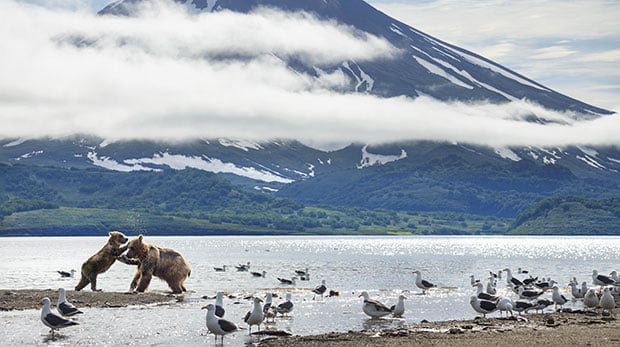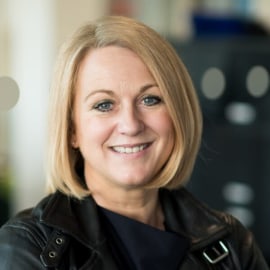Green screens
Is the TV industry making enough effort to implement sustainable practices and face up to the climate emergency, on- and off-screen?

Phil Holdgate
As a result of one hour of TV production, around 9.2 tonnes of carbon dioxide are emitted into the atmosphere. It’s a shocking figure and one of many to have come out of Albert’s latest annual report into the industry’s impact on the environment from 2017 to 2019.
Founded in 2011, UK-based Albert is part of the Bafta family and is the screen industry authority on environmental sustainability. It offers support to producers on how to tackle their environmental impact, as well as develop on-screen content that is compatible with a sustainable climate.
Albert’s industry sustainability manager, Roser Canela-Mas, spoke recently at a Royal Television Society (RTS) virtual event on the topic of sustainable production and called for wider-reaching change. “Free, reusable water bottles are a good starting point, but we really need to look at how we operate as a business. In order to be more resilient in the future, we need to change every aspect of our business,” she said.
While talking about the climate emergency and pledging to adopt eco-friendly methods are the first steps towards tackling the problem, what can be done to put them into practice? Speaking at the same event, Phil Holdgate, head of production sustainability at UK producer and distributor ITV Studios (ITVS), explained how a four-pronged approach, centred on “science-based targets,” was being put in place to boost the sustainability of productions.

Discovery+ content includes A Perfect Planet
The four pillars of the strategy are energy, waste, sourcing and changing culture, according to Holdgate, who works to ingrain sustainability into productions such as long-running ITV soap Emmerdale.
“With energy, we’re looking at things like powering our buildings with renewable energy and looking at emission we can directly control,” he explained. “In terms of waste, we’re looking at how we can eliminate it in the first place and then how we manage it on an ongoing basis.”
“Our third strand is sourcing. Well over 90% of our emissions come from supply chains and so it is not in our direct control. There is a huge piece of work underway at the minute with some great support from our procurement team and industry collaboration, because a lot of producers and broadcasters share the same supply chain.
“Changing culture is the fourth area. My stock phrase is, ‘Being sustainable isn’t my job, it’s everybody’s job.’ So how do we get to that position where everyone working on the production and everyone else in the business is working towards that common goal?”
Holdgate said a shift in culture was well underway with “people genuinely keen to be green,” but acknowledged there was a “recurring need” for guidance and direction.
“There has been a little bit of misinterpretation sometimes,” he said. “There was an interesting conversation around replacing some diesel cars with hybrids cars, and there was that typical situation where maybe the manufacturers had greenwashed [the hybrid cars] a little bit. What was deemed a hybrid car was actually no better than the diesel models they were looking to replace. There’s some guidance and direction needed around the solutions.”

Richard Watsham
For Richard Watsham, director of commissioning at multi-channel operator UKTV, who joined Canela-Mas and Holdgate on the online panel, a proactive measure to increase the transparency of production would be the introduction of a “DNA card.” This, Watsham explained, would detail, among other things, the carbon credentials of the show and would travel with it when it is sold around the world.
“What is really problematic is when we acquire content from other people [because we do not have information on the production process]. I would love to see a DNA card that has a detailed passing of information that is linked to that show wherever it goes,” he said.
Watsham believes the UK could take a leading role in such a scheme. “This DNA card would rely on producers and broadcasters being prepared to share information and for the UK to lead in that respect, and there’s no reason why we shouldn’t,” he said.
As part of a push towards raising awareness around the climate emergency, Watsham said UKTV has “embraced” Albert’s Planet Placement initiative. This looks at how film and TV content can introduce messages about sustainability. “We try to embed awareness references and reminders of the issues of climate change in all of our programmes, irrespective of genre,” Watsham explained.
Natural history as a genre is “well positioned” to address the environment, he believes, but added that there are opportunities to promote eco-friendly living across all genres. As an example, he “actively encourages” drama and comedy writers to find ways of mentioning and referencing the climate emergency. “Do we currently have an eco-thriller on the books? No, we don’t. Would I rule that out in the future? Absolutely not. The value here is that all our shows having visual and verbal references [to the climate emergency]. The big one for me is having those messages embedded in all of our content,” he said.
In addition to messaging across all genres, Watsham argued that creative messaging is key to tapping into audiences. “If we want to reach the periphery, we have got to be more imaginative in how we get our message across, and that is where the power of placement comes,” he said. “If you shout loudly in someone’s face, they might not want to listen.”
Holdgate agreed and underlined the importance of programmes engaging with and using positive messaging about the environment. “Great action sometimes comes from optimism. That is maybe where TV can play a vital role as we have such a unique platform and we have the ability to reach out to people,” he said.
This was a point also raised by Watsham, who said TV’s power to effect change extended beyond production to viewers. “It is clear that one of the biggest impacts the TV industry can have is influence. We can influence individuals, authorities and countries around the world. That is going to have a more significant impact on us than doing important work within our own industry to reduce our carbon footprint. So those two things need to go hand in hand,” he said.

Jane Atkinson
On that front, viewers of recent BBC Studios-distributed blue-chip natural history series A Perfect Planet saw in the final episode what humans can do to restore our planet’s balance.
Completing the RTS session’s line-up was Jane Atkinson, senior VP of global production at Fremantle, who said the biggest hurdle for sustainable productions across the global giant is the imbalance between different territories’ progress when it comes to sustainability. “We have a broad range of companies and some, such as the Scandinavians, are far ahead. They have access to renewable energy, while other countries won’t have access to that for a long time,” she said.
A solution, Atkinson suggested, would be wider industry collaboration. “We need other companies to come on board in the territories that we are in, because we can’t operate in isolation,” she said. “We really need engagement with broadcasters as well. Already, we do have a couple of international broadcasters who are in alignment with Albert, which is a fantastic resource for everyone.”
In terms of approaching the production process in an environmentally friendly way, Atkinson singled out staff working on the Italian version of The X Factor, from Fremantle Italy and Simon Cowell’s Syco Entertainment, for thinking outside of the box.
“[The producers of] the Italian X Factor typically produce their audition shows in a huge circus tent. But they had noticed there was a building company in Rome that had been hired by the government to reduce its emissions. In order to do that, they had put an advertising billboard made from fabric on the exterior of the buildings and it absorbed pollution from the cars. X Factor approached the company and asked if they could make the tent out of the same material,” she said.
It is clear the industry has woken up to the climate crisis, with events like the RTS session being held, discussions ongoing and action finally being taken. Hopefully, a carbon neutral future and sustainability will soon no longer need to be discussed because they will have become part and parcel of everyday life – including within the TV business.







































